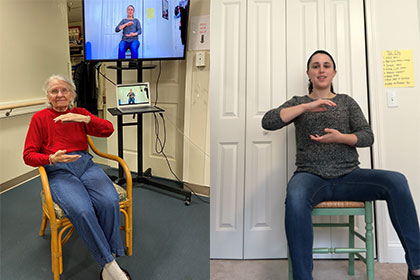We’ve seen the images: an elderly nursing home resident on the far side of a window, looking out at family members, hands pressed to the glass the only means of contact.

(Left) Maria DesRochiers and (Right) Claudia Russell
The "COVID-19: The Larner Community Responds" series highlights stories about Larner College of Medicine students, faculty and staff who are answering the call for help during the COVID-19 pandemic.
We’ve seen the images: an elderly nursing home resident on the far side of a window, looking out at family members, hands pressed to the glass the only means of contact. Understanding that staff members at such residences have been stretched thin by COVID-19, Claudia Russell ’22 and Ashleigh Peterson ’22 decided to help out, together with other Larner College of Medicine students, and with the guidance of Janet Nunziata, MS, associate director of the UVM Center on Aging and coordinator of the Queen City Memory Café.
Russell has volunteered at area Memory Cafés, events where people with dementia or other brain disorders can enjoy music, crafts, dancing, and games. Through this activity she connected with Cameron Segal, deputy director of Living Well Group, which operates three activities-focused residences in the state. When the pandemic set in, Segal reached out to Russell to see if she could round up a group of students to volunteer at Living Well residences in Burlington, Bristol, and Montpelier.
“Right now, the safest way to get involved is virtually, so he came up with the idea to have virtual activities,” says Russell. “We reached out to our classmates to see if anybody had any special activities they wanted to lead.”
They did: Jacob Weiss ’22 pulled out his guitar and led a sing-along at Heaton Woods of favorites including The Temptations’ “My Girl.” Julia Clemens ’22 read Alice’s Adventures in Wonderland aloud for an hour; her engaged audience begged for more, so she promised to come back to finish it. Russell, who plans to specialize in geriatric medicine, is teaching a weekly half-hour chair tai chi class on Sundays at the Ethan Allen Residence via FaceTime. She’s taught tai chi before, when she worked at an adult day health center. Now, she’s adapting to only being able to see three people at a time on her screen.
“You can't really tell if people are engaged, if they're confused. But the staff at the centers have been great: I can hear them in the background, keeping people engaged,” says Russell, adding that overall, participants seem unfazed by the setup.
Peterson and Russell are also reaching out with a tool that’s somewhat more familiar to area seniors: the telephone. They are working with Beth Hammond, executive director of Burlington’s Heineberg Community Senior Center, to expand its phone buddies program, a social-distancing alternative to its regular support buddies offering. Heineberg had been invited to coordinate with Pinecrest, a senior living facility in Essex that had an early outbreak of COVID-19.
“I thought it would be reassuring [to residents] to include the group of UVM medical students in the partnership,” says Hammond. That collaboration has since expanded to include Taft Farms in Williston, along with several residences in Burlington.
“There definitely is a lot of fear in these facilities right now. People are scared to walk outside—they’re scared to go out beyond their porch,” says Peterson. “One of my buddies was grateful to have a medical student, because she was confused about some of the medical aspects of coronavirus. And she's like, ‘Okay, when do I actually have to wash my hands. What can I touch? What can't I touch? What's safe? What's not safe?’” Separately, Peterson has paired Larner students with residents of The Pines in South Burlington and Thayer House in Burlington, as well as people living independently and receiving assistance from Support and Services at Home (SASH). In addition to providing a telephonic connection, students are helping seniors complete order forms for grocery delivery service.
Hammond says the Larner students, who report to her regularly on how the seniors are doing, have had a very real impact, as when Peterson couldn’t reach a woman who had asked for a daily call. Peterson alerted Hammond, who contacted the facility’s management company, who then called the police. A welfare check found that the woman was fine—she’d accidentally unplugged her phone.
“Ashleigh was the only person she’d been talking with, so that was huge,” says Hammond. “It shows the process is working, and I’m sure it made her buddy feel good, as surprised as she was to see the police officers.”
Though these efforts arose because of the pandemic, they may well linger after the crisis eases. Nunziata says the response to the students’ efforts has been positive, and that their impact will last.
“At some point, the med students may get too busy to continue it,” she says. “But I think the different communities may try to implement something like this, with other volunteers. It could stimulate even more people becoming involved in a similar way. And I think it’ll be needed.”